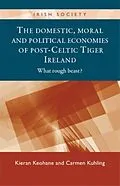This book provides an analysis of neo-liberal political economics implemented in Ireland and the deleterious consequences of that model in terms of polarised social inequalities, impoverished public services and fiscal vulnerability as they appear in central social policy domains - health, housing and education in particular. Tracing the argument into the domains where the institutions are sustained and reproduced, this book examines the movement of modern economics away from its original concern with the household and anthropologically universal deep human needs to care for the vulnerable - the sick, children and the elderly - and to maintain inter-generational solidarity. The authors argue that the financialisation of social relations undermines the foundations of civilisation and opens up a marketised barbarism. Civic catastrophes of violent conflict and authoritarian liberalism are here illustrated as aspects of the 'rough beast' that slouches in when things are falling apart and people become prey to new forms of domination.
Autorentext
Kieran Keohane is a Senior Lecturer in Sociology at University College, CorkCarmen Kuhling is a Senior Lecturer in Sociology at the University of Limerick
Klappentext
This book examines the collective representation of Ireland after the sudden death of the 'Celtic Tiger'. The central organising theme is articulated by Yeats (1920) in his famous poem 'The Second Coming': in a period following crisis, in conditions of liminality and anomie, when 'Things fall apart; the centre cannot hold', Yeats asks: ' what rough beast, its hour come round at last, / slouches towards Bethlehem to be born?' Three sections follow, on the domestic, moral and political economies of post-Celtic Tiger Ireland. These categories are not analytically separated in this book, for such analytic separation has been at the very source of the problem of the fragmentation of knowledge, the retreat into the present, and the losing sight of ideals. All three are treated as an integrated whole, and in this way economics is reconciled and situated within its wider parental discourses of society as 'collective household' and the primary processes and principles of social integration. Not only is oikos the root of 'economics', it is also the root of 'ecology' broadening the frame to integrate issues of environment and speaking to themes of sustainable development on one level, and at another level to the themes of mythology, lore and poetic unity that comprise the linguistic household of society. The reconnecting of economics with historical and general anthropological deep human needs explores the grounds for a re-humanised political economics and suggests pathways to a sustainable future other than a second coming of recent patterns.
Inhalt
IntroductionPart I: Domestic economy1. Ireland's haunted houses2. The values of house & home3. Foundations of Europe's collective householdPart II: Moral economy4. Fair trade and free market5. Political theologies in the wake of the Celtic Tiger6. Conversion: turning towards a radiant ideaPart III: Political economy7. Pleonexic tyranny in Plato's Republic and in the Irish republic8. Anamnesis for a New IrelandConclusionIndex
